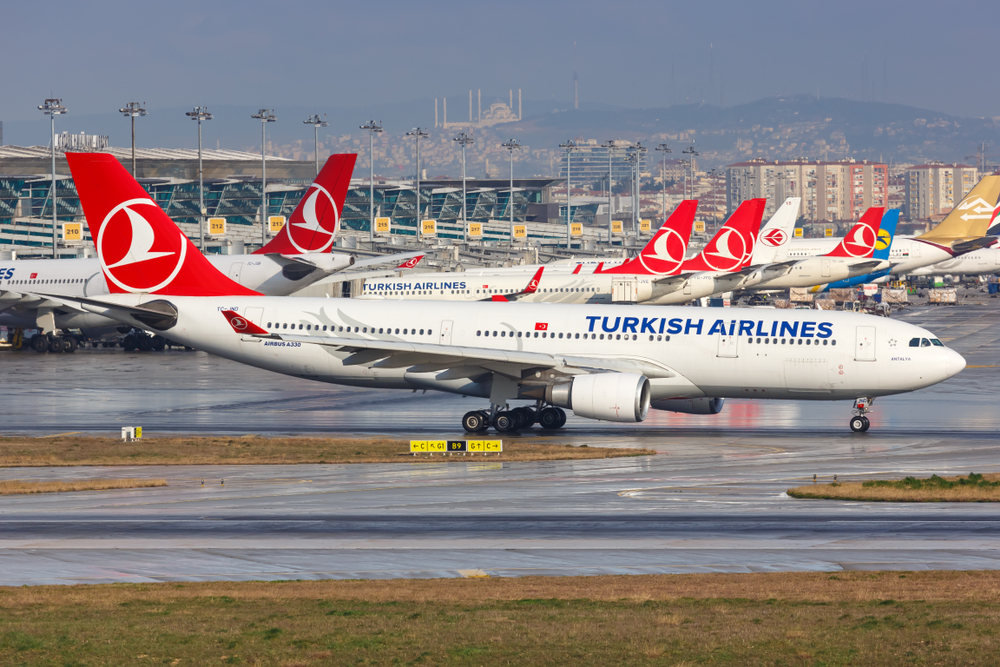Turkish Airlines is continuing its meteoric rise in world airline rankings as the carrier announces its traffic figures for May 2024. Operating a fleet of over 400 aircraft during the month, the Istanbul-based carrier has reported increases across almost all major metrics as it continues to enter new markets while increasing frequencies on others.
In May 2024, the airline increased its total capacity by 7.3% in terms of available seat kilometers (ASKs) year-on-year, reaching 21.3 billion ASKs during May 2024 from 19.9 billion in May 2023. The carrier flew a total of 7.2 million passengers and achieved a network load factor of 79.8% overall during the month. While international flights saw an average load factor of 79.3%, the carrier’s domestic load factor reached 84.2%.
The number of international-to-international transfer passengers increased by 3.6% from 2.4 million in 2023 to 2.5 million in the same period in 2024.
Meanwhile, air cargo carried during May 2024 increased to 174,400 tons, up from 135,400 thousand tons in the same period of 2023, representing a year-on-year increase of 28.8%.
In terms of year-to-date performance (January to May 2024), The carrier’s total number of passengers increased by 5.7% to 32.8 million compared to the same period of 2023. The number of international-to-international passengers carried increased to 12.6 million from 11.8 million – a year-on-year increase of 7%.

Overall load factors for the period decreased slightly by 0.8 points to 80.4% compared to the same period of 2023. The international load factor was 80% while the domestic load factor was 83.8%, largely due to larger aircraft flying many routes as new planes arrive in the fleet from Boeing and Airbus. Evidencing this, capacity in terms of ASKs for the period increased by 10.8% to 100 billion from 90.3 billion for the same period of 2023.
Cargo figures for the first five months of 2024 increased by 33.7% to 814,700 tons from 609,200 tons in the same period of 2023.
According to ch-aviation, the Turkish Airlines fleet currently stands at 419 aircraft. This figure comprises Airbus A319s (six), A320s (12), A320neos (nine), A321s (65), A321neos (58), A330-200s (13) A330Fs (13), A330-300s (36), A350-900s (15), Boeing 737-800s (79), 737 MAX 8 (27), 737-900ER (15), 737 MAX 9 (five), 777-200F (eight), 787-8 (35) and 787-9 (23).
Services to Denver begin
With new aircraft arriving into the Turkish Airlines fleet constantly, the carrier continues to find new markets to deploy these planes. One such example is Denver International Airport (DEN), to which the carrier commenced regular direct services from Istanbul Airport (IST) on June 11, 2024.
The inaugural flight (TK201) departed Istanbul at 12:59 and arrived in Denver at 15:47 local time, taking a total of 11 hours and 48 minutes to complete the journey. The return flight (TK202) left Denver at 18:54 and is still en route back to Istanbul at the time of writing. A Boeing 777-300ER operated both flights (registered TC-LJE).
The new route becomes the longest scheduled service on offer at Denver Airport, at around 6,130 miles (9,865 km) and with a duration of around 13 hours. This record was previously held by flights between Denver and Tokyo, clocking in at around 12 hours or covering 5,788 miles (9,314 km).
Flights between Istanbul and Denver depart from Turkey on Tuesdays, Thursdays, and Fridays, while a fourth weekly flight (on Sundays) will commence on July 9, 2024. Turkish Airlines is the 26th airline to operate at Denver International Airport while the city itself becomes Turkish Airlines’ 14th US destination served.

